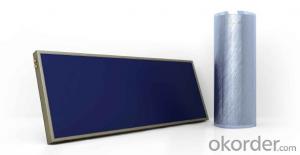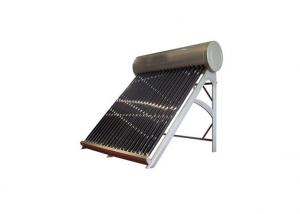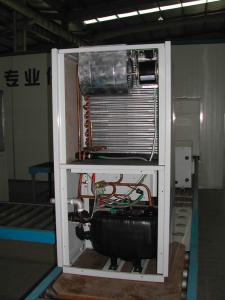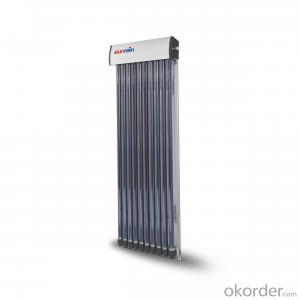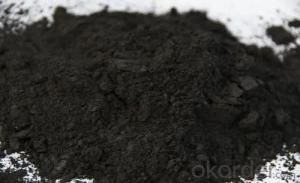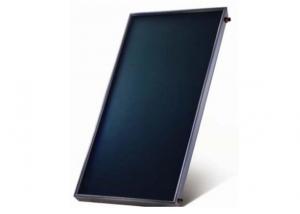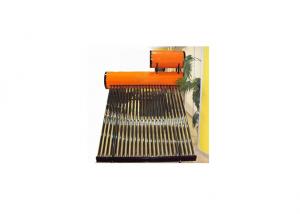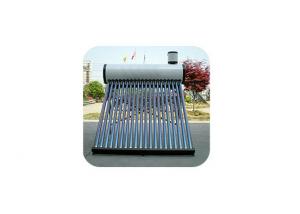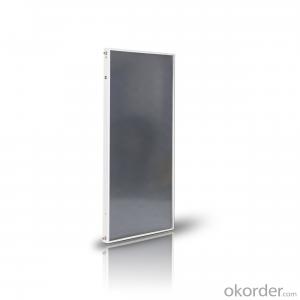Balcony Hung Solar Water Heating System(Luxury)
- Loading Port:
- Tianjin
- Payment Terms:
- TT OR LC
- Min Order Qty:
- 1 set
- Supply Capability:
- 10 set/month
OKorder Service Pledge
OKorder Financial Service
You Might Also Like
1.Structure of Balcony Hung Solar Water Heating System(Luxury)
Solar water heating system is the most widely used product with regard to the solar energy application in daily life. Our Balcony Hung Solar Water Heating System(Luxury) is updated compared to the Standard version. It comes with grand flat plate solar collector, and with multiple modularized insulation technology, it will bring to the users better experience. This product is ideal for home as well as for hotel and restaurant.
2. Main Features of Balcony Hung Solar Water Heating System(Luxury)
Grad flat plate solar collector: high price/ performance ratio;
seamless integration with modern architecture;
intellectual control to match human centered concept.
large water tank to stock more water and advanced technology to ensure consistent water flow.
3. Balcony Hung Solar Water Heating System(Luxury) Images
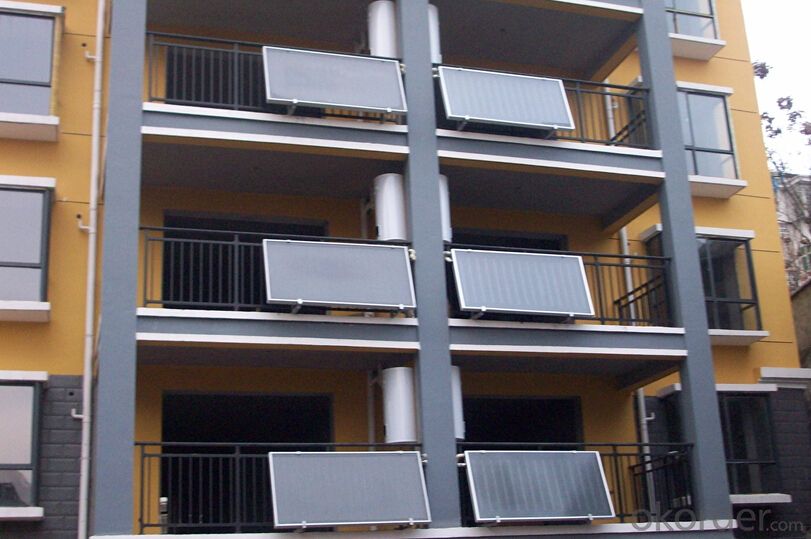
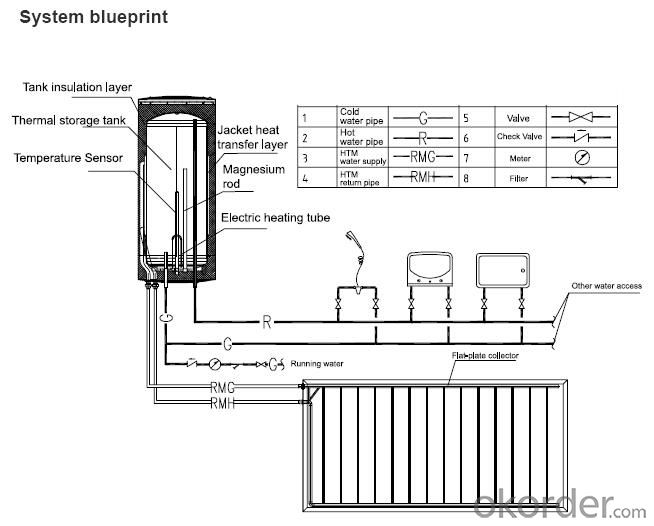
4. Balcony Hung Solar Water Heating System(Luxury) Specification
| Model | Volume (L) | Tank Dimension (mm) | Solar Collector Model | Collecting Area (m2) | Balcony Width(m) |
| PJF-2-80-3 | 80 | Φ480×860 | P-G/0.6-L/L7-1.8-303 | 2 | ≥2.5 |
| PJF-2-100-3 | 100 | Φ480×1030 | P-G/0.6-L/L7-1.8-303 | 2 | ≥2.5 |
5. FAQ
1. Q: Do you have certificate for the products?
Re : Thank you for your attention to our products, and we have product certificate as follows:

2. Q: Can the products be modified?
Re:Yes, the products can be modified according to specific requirement. We'd like to advise you futhur communication in details with us.
- Q:Can a solar water heater be used in areas with limited access to water storage tanks?
- Yes, a solar water heater can still be used in areas with limited access to water storage tanks. While water storage tanks are commonly used to store hot water for later use, they are not a requirement for a solar water heater to function. Solar water heaters work by harnessing the sun's energy to heat water directly or through a heat transfer fluid. In areas with limited access to water storage tanks, alternative methods can be employed to store the heated water temporarily. For example, instead of using a dedicated water storage tank, the solar water heater can be connected directly to the plumbing system, allowing hot water to flow directly from the solar collector to the faucets and fixtures in the building. This eliminates the need for a separate water storage tank. Another option is to use a smaller storage tank or even a heat exchanger, which can store a limited amount of hot water. This allows for immediate use of the heated water and reduces the need for larger storage tanks. In some cases, it may also be possible to implement a hybrid system that combines a solar water heater with a smaller storage tank and an auxiliary heating source, such as a gas or electric heater. This ensures a constant supply of hot water even in periods of low solar availability. Therefore, while water storage tanks are commonly used in conjunction with solar water heaters, they are not essential in areas with limited access. Alternative methods can be implemented to store and distribute the heated water efficiently, allowing for the use of solar water heaters in various situations.
- Q:How does the installation cost of a solar water heater compare to a traditional water heating system?
- The installation cost of a solar water heater is typically higher than that of a traditional water heating system. However, the long-term savings on energy bills and the potential for government incentives and tax credits can offset the initial investment and make solar water heaters a cost-effective option in the long run.
- Q:How much space is required to install a solar water heater?
- The space required to install a solar water heater depends on various factors, such as the size and type of the system, the number of solar panels, and the available roof or ground space. Generally, a typical solar water heater system may require around 10-20 square feet of roof space per panel or a designated area in the yard, preferably facing south with minimal shading, for proper installation. However, it's best to consult with a professional installer who can assess your specific needs and provide accurate space requirements for your solar water heater installation.
- Q:What is the lifespan of the solar collectors used in a solar water heater?
- The lifespan of the solar collectors used in a solar water heater can vary depending on various factors such as the quality of the collectors, the maintenance and care given to them, and the climatic conditions they are exposed to. However, on average, high-quality solar collectors can last for 20 to 30 years or even longer with proper maintenance. The lifespan of the solar collectors is primarily determined by the durability of their components, especially the absorber plate and the glazing materials. The absorber plate, which absorbs the sun's energy and transfers it to the water, is usually made of materials like copper or aluminum with a selective coating to maximize efficiency. These materials are designed to withstand prolonged exposure to sunlight and thermal cycling without significant degradation. The glazing materials, typically tempered glass or a transparent polymer, protect the absorber plate from external elements while allowing sunlight to pass through. The quality and thickness of the glazing can affect their lifespan. High-quality glazing materials are designed to resist UV degradation, extreme temperatures, and impacts from hail or debris. Regular maintenance and inspections can help extend the lifespan of solar collectors. It is advisable to clean the collectors periodically to remove dust, debris, and any buildup that may reduce their efficiency. Additionally, proper care should be taken to prevent freezing or excessive pressure buildup within the collectors during colder climates. Overall, investing in high-quality solar collectors, ensuring regular maintenance, and protecting them from extreme weather conditions can significantly prolong their lifespan, providing reliable solar heating for water for many years.
- Q:Solar water heater to maintain it?
- 2, solar water heater in the use of the process should pay attention to what problems? Pay attention to water time. According to the weather conditions, determine the amount of water, to ensure that the appropriate bath temperature. Regularly check the water heater pipe, vent and other components are working properly. The air conditioning is serious or the sand is big, and the dry area is periodically flushed the vacuum tube.
- Q:What are the installation requirements for solar panels used in a solar water heater?
- The installation requirements for solar panels used in a solar water heater may vary depending on the specific system and location. However, there are some general requirements that are common for most installations. Firstly, it is essential to have an unobstructed area with adequate sunlight exposure. The solar panels should ideally be installed on a south-facing roof or an area that receives maximum sunlight throughout the day. Shading from nearby trees, buildings, or other obstructions should be minimized to ensure the panels receive maximum sunlight. The roof or supporting structure on which the solar panels are installed should be strong enough to bear the weight of the panels. Solar panels are quite heavy, and the roof should be able to withstand the additional load. If necessary, reinforcement may be required to ensure the safety and stability of the installation. The solar panels should be securely mounted to the roof or support structure using appropriate mounting equipment. The mounting system should be able to withstand high winds, snow loads, and other environmental factors. It is important to follow the manufacturer's instructions and guidelines for proper installation. In addition to the solar panels, a solar water heater system also requires a storage tank, plumbing connections, and other components. These components should be installed according to the manufacturer's instructions and local building codes. It is advisable to consult a professional installer or a licensed plumber to ensure proper installation and compliance with safety regulations. Furthermore, electrical connections are necessary to connect the solar panels to the water heater system. A qualified electrician should be involved in the installation to ensure proper wiring, grounding, and compliance with electrical codes. Safety precautions should be followed to prevent electric shocks or other electrical hazards. Overall, the installation requirements for solar panels used in a solar water heater involve considerations such as sunlight exposure, structural integrity, proper mounting, plumbing connections, electrical wiring, and adherence to local building codes. It is recommended to consult professionals, such as solar installers, plumbers, and electricians, to ensure a safe and efficient installation.
- Q:How does the altitude of a location impact the performance of a solar water heater?
- The altitude of a location can impact the performance of a solar water heater in a couple of ways. Firstly, higher altitudes often have lower air density, which can reduce the amount of heat that can be transferred from the sun to the water. Secondly, at higher altitudes, the air is usually cooler, which can also decrease the overall efficiency of the solar water heater. Therefore, solar water heaters may not perform as efficiently at higher altitudes compared to lower altitudes.
- Q:Are there any health benefits associated with using a solar water heater?
- Yes, there are several health benefits associated with using a solar water heater. One of the primary benefits is the reduction in exposure to harmful chemicals and toxins found in traditional water heating systems. Solar water heaters do not require the use of fossil fuels, such as natural gas or oil, which can release harmful emissions during the heating process. By utilizing clean and renewable solar energy, the water heated by solar water heaters is free from these pollutants, resulting in improved indoor air quality and reduced risk of respiratory problems. Additionally, solar water heaters can help to prevent the growth of harmful bacteria and microorganisms in the water supply. Traditional water heaters often store hot water in tanks, providing a suitable environment for the growth of Legionella bacteria and other pathogens. Solar water heaters, on the other hand, heat water on-demand, minimizing the risk of bacterial contamination and reducing the chances of waterborne diseases. Moreover, using a solar water heater can have positive effects on skin health. Traditional water heating systems often rely on hard water, which contains a high concentration of minerals like calcium and magnesium. These minerals can dry out the skin and hair, leading to issues like dryness, itchiness, and dandruff. Solar water heaters, however, can be equipped with water softening systems that remove these minerals, resulting in softer and healthier skin and hair. Finally, the use of solar water heaters can contribute to overall mental and emotional well-being. By reducing reliance on non-renewable energy sources, individuals can feel a sense of satisfaction and pride in their contribution to a healthier and more sustainable environment. This positive mindset can have a cascading effect on mental health, improving mood, reducing stress, and promoting overall well-being. In conclusion, the use of solar water heaters offers a range of health benefits, including reduced exposure to harmful chemicals, prevention of bacterial contamination, improved skin health, and positive impacts on mental well-being. By harnessing the power of the sun, solar water heaters provide a sustainable and health-conscious solution for heating water.
- Q:Can a solar water heater be used in areas with limited access to skilled workforce or trained technicians for installation or maintenance?
- Yes, a solar water heater can be used in areas with limited access to skilled workforce or trained technicians for installation or maintenance. Solar water heaters are designed to be relatively simple systems that can be installed and maintained by individuals with basic technical skills. They often come with detailed installation and maintenance manuals that provide step-by-step instructions for the process. Additionally, many solar water heater manufacturers offer training programs and resources that can help individuals in these areas learn the necessary skills for installation and maintenance. These resources may include online tutorials, video guides, or even on-site training sessions. By providing accessible and user-friendly resources, manufacturers aim to empower individuals in areas with limited access to skilled labor to install and maintain solar water heaters themselves. Furthermore, solar water heaters are generally designed to be durable and require minimal maintenance. They are built with high-quality materials and components that can withstand various weather conditions and last for many years with minimal maintenance. This reduces the need for frequent technical interventions, making them suitable for areas where skilled workforce or trained technicians may be scarce. Overall, while having access to skilled workforce or trained technicians can be beneficial, it is possible to install and maintain a solar water heater in areas with limited access to such resources. With proper guidance, training, and durable design, individuals in these areas can successfully utilize solar water heaters to meet their hot water needs.
- Q:Can a solar water heater be used in areas with limited access to government support or policies promoting renewable energy?
- Certainly, areas with limited government support or policies promoting renewable energy can still utilize solar water heaters. These devices are an excellent choice for such locations, as they operate independently of grid electricity and utilize the abundant energy of the sun to provide hot water. Solar water heaters are relatively straightforward and cost-effective technologies that can be easily installed and maintained. They consist of a solar collector that absorbs sunlight to heat water, which is then stored in an insulated tank for later use. This means that individuals or communities in areas without government support can still utilize the power of the sun to satisfy their hot water needs. Additionally, solar water heaters offer significant financial and environmental benefits. They can substantially reduce energy bills and decrease dependence on fossil fuels. Moreover, they can be used in both residential and commercial settings, making them versatile and adaptable to various situations. While government support and policies promoting renewable energy can undoubtedly expedite the adoption of solar water heaters and other renewable energy technologies, they are not essential for their utilization. In areas lacking such support, individuals and communities can still take advantage of the benefits provided by solar water heaters through their own initiative. In conclusion, a solar water heater is a viable option for areas with limited access to government support or policies promoting renewable energy. Its simplicity, cost-effectiveness, and ability to harness solar energy make it a practical and sustainable solution for those seeking alternative energy sources.
1. Manufacturer Overview |
|
|---|---|
| Location | |
| Year Established | |
| Annual Output Value | |
| Main Markets | |
| Company Certifications | |
2. Manufacturer Certificates |
|
|---|---|
| a) Certification Name | |
| Range | |
| Reference | |
| Validity Period | |
3. Manufacturer Capability |
|
|---|---|
| a)Trade Capacity | |
| Nearest Port | |
| Export Percentage | |
| No.of Employees in Trade Department | |
| Language Spoken: | |
| b)Factory Information | |
| Factory Size: | |
| No. of Production Lines | |
| Contract Manufacturing | |
| Product Price Range | |
Send your message to us
Balcony Hung Solar Water Heating System(Luxury)
- Loading Port:
- Tianjin
- Payment Terms:
- TT OR LC
- Min Order Qty:
- 1 set
- Supply Capability:
- 10 set/month
OKorder Service Pledge
OKorder Financial Service
Similar products
New products
Hot products
Related keywords
